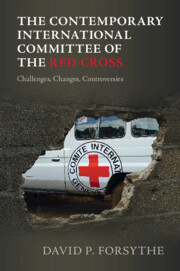Book contents
- The Contemporary International Committee of the Red Cross
- The Contemporary International Committee of the Red Cross
- Copyright page
- Dedication
- Contents
- Photographs
- Preface: Who and Why
- 1 The Contemporary ICRC and Its Critics
- 2 The ICRC and the Global Humanitarian System
- 3 History
- 4 History
- 5 The Red Cross Movement
- 6 The Red Cross Movement
- 7 ICRC Relations with Bern
- 8 ICRC Relations with Bern
- 9 Humanitarians and Business
- 10 Humanitarians and Business
- 11 Interpreting the Mandate
- 12 Interpreting the Mandate
- 13 Has the Traditional Focus Been Lost?
- 14 Has the Traditional Focus Been Lost?
- 15 ICRC Governance and Management
- 16 ICRC Governance and Management
- 17 Conclusion
- 18 Conclusion
- Epilogue
- Annex
- Index
11 - Interpreting the Mandate
Part I – From Relief to Resilience
Published online by Cambridge University Press: 01 February 2024
- The Contemporary International Committee of the Red Cross
- The Contemporary International Committee of the Red Cross
- Copyright page
- Dedication
- Contents
- Photographs
- Preface: Who and Why
- 1 The Contemporary ICRC and Its Critics
- 2 The ICRC and the Global Humanitarian System
- 3 History
- 4 History
- 5 The Red Cross Movement
- 6 The Red Cross Movement
- 7 ICRC Relations with Bern
- 8 ICRC Relations with Bern
- 9 Humanitarians and Business
- 10 Humanitarians and Business
- 11 Interpreting the Mandate
- 12 Interpreting the Mandate
- 13 Has the Traditional Focus Been Lost?
- 14 Has the Traditional Focus Been Lost?
- 15 ICRC Governance and Management
- 16 ICRC Governance and Management
- 17 Conclusion
- 18 Conclusion
- Epilogue
- Annex
- Index
Summary
This chapter begins to examine one of the important arguments by some critics, namely that ICRC activities have become so broad and sprawling that it has lost its status as an expert actor on the laws of war (both legal development and implementation), along with protection of political prisoners. The chapter first reminds the reader that there is no binding authority above the ICRC; hence, the ICRC governing board decides how to interpret its mandate or basic role – which essentially dates from 1930. In deciding what humanitarian subjects should be addressed by the ICRC, one of the most important is taking humanitarian assistance beyond immediate relief to include a type of development or early recovery. The author finds the direction of this policy commendable but without clear limits. The dividing line between humanitarian recovery and political development remains uncertain. That line seems to lie more in the realm of subjective labelling than objective and definable facts. The distinction is often controversial as in contemporary Afghanistan and Syria, among other places.
Keywords
- Type
- Chapter
- Information
- The Contemporary International Committee of the Red CrossChallenges, Changes, Controversies, pp. 220 - 249Publisher: Cambridge University PressPrint publication year: 2024

